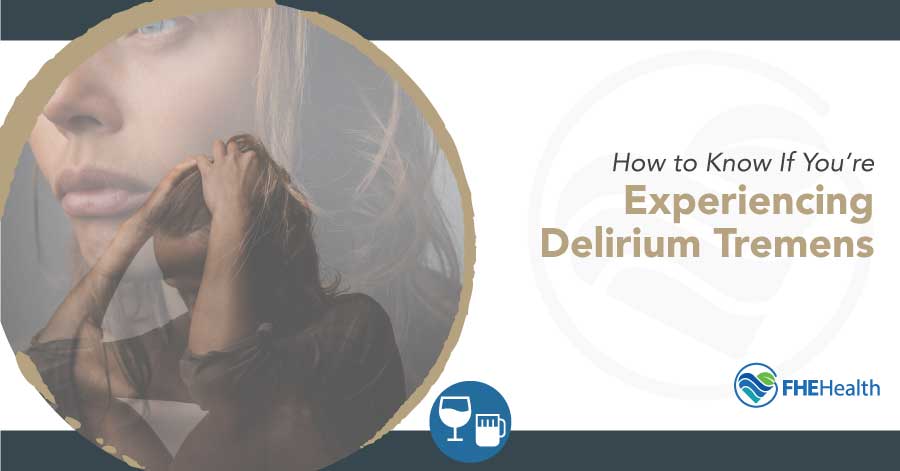
If you drink heavily, your body may become dependent on alcohol. Quitting drinking in this situation is definitely a good thing, and you’re to be commended for it — it’s not an easy thing to do, and it’s the first step on the path to recovery.
But unfortunately, in a somewhat cruel, ironic twist, quitting alcohol cold turkey may itself bring serious health risks, including delirium tremens (DT).
Of course, taking steps to stop drinking when it’s become a problem in your life is a positive change, but those who quit drinking abruptly may not be able to manage what comes next.
Although it’s a relatively rare symptom of alcohol withdrawal, delirium tremens can be life-threatening — and it requires medical attention if you’re experiencing it. So it’s important to understand what it is in case you or a loved one could be going through DT.
What Are the Risk Factors of DT?
In people withdrawing from alcohol, DT is most common in those whose regular daily consumption is among the following: 4 to 5 pints of wine, 7 to 8 pints of beer or 1 pint of hard alcohol. DT most commonly affects people who’ve been using alcohol for a decade or more. It’s also more common in those who’ve already experienced alcohol withdrawal when attempting to quit drinking in the past.
There are certain factors that make one person more likely than another to experience DT. They include:
- Going cold turkey
- Being over 65
- Having a history of head injuries or strokes
- Liver cirrhosis
- Kidney failure
- Hypoglycemia
While not everyone who quits drinking experiences DT, if you have several of the above risk factors, you may be likely to.
What Are Symptoms of DT and What Does It Feel Like?
DT is a series of symptoms experienced as shaking, sweating, irregular heart rate, confusion and even visual and auditory hallucinations. You may have just a few or all of these, but they’re all serious and should be cause for concern if you’re experiencing them after quitting heavy drinking.
At its most serious, delirium tremens can lead to high temperatures, seizures, stroke and death. Experiencing seizures from DT is most common 12 to 48 hours following the last drink.
There are many symptoms those with DT will experience, and if you’re feeling a number of them — or witnessing a loved one experiencing them — you should contact 911 or visit an emergency room, as the DT can in fact be fatal.
Going through DT is not necessarily the clearest situation. You may experience a number of the most common symptoms while not experiencing the others at all. But if you’re feeling a number of the symptoms, you’re at risk and should seek medical help immediately.
Some of the serious symptoms you may experience related to the DT include:
- Body shakes and tremors
- Extreme confusion
- Long-lasting spells of sleep
- Delirium
- Excessive mood swings
- Fearfulness
- Trouble focusing
- Oversensitivity to sounds, lighting and touch
- Irritability
- Restlessness
- Loss of appetite
- Body aches
- Chest pain
Another useful way of assessing how serious your symptoms might be is to consider where you fall on the Clinical Institute Withdrawal Assessment Alcohol Scale Revised (CIWA-Ar). This 10-point scale is used by doctors to determine how serious your alcohol withdrawal symptoms may be.
-
- Do you feel sick to your stomach and have you vomited?
- Do you have any itching, pins and needles sensations, burning or numbness or do you feel bugs crawling on or under your skin?
- Extend your arms and spread your fingers — are there observable tremors?
- Are you hearing things you know aren’t there?
- Are you showing signs of sweating?
- Are you seeing anything that’s disturbing to you? Are you seeing things you know aren’t there?
- Do you feel nervous?
- Does your head hurt or feel different? Does it feel like there’s a band around your head?
- Do you appear to be agitated?
- What day is it? Where are you?
When Do DT Start?
Symptoms of DT tend to start within 48 to 96 hours after you’ve had your last drink, but they can occur as much as 7 to 10 days after the last drink.
What Should You Do If You See Signs of DT?
If you suspect you’re experiencing delirium tremens or believe a loved one is, you should know that it’s a serious medical condition and one you absolutely need to seek help for.
You shouldn’t attempt to just “get through it” by waiting out the symptoms and hoping for the best. It’s truly a situation in which you should call 911 or visit the emergency room.
What Help Is There for You If You Are Experiencing DT?
Treating DT in a detox facility is the safest way to reduce risk of death from organ failure and other complications.
When someone checks into a detox facility to treat delirium tremens, they’re given sedatives under medical supervision. Those experiencing DT are asleep throughout the worst of the symptoms, and the sedation itself can lessen them.
Depending on the severity of the DT symptoms, sedation can last for a week and sometimes even longer.
How to Seek Help for DT
If you’re experiencing DT, you shouldn’t try to white-knuckle it alone — instead, consider seeking treatment from FHE Health. Delirium tremens is a life-threatening issue, so our alcohol detox programs are covered by medical insurance. Contact FHE today by calling us 24/7 at (855) 789-1468 and let our team of counselors help you start your journey to recovery.






